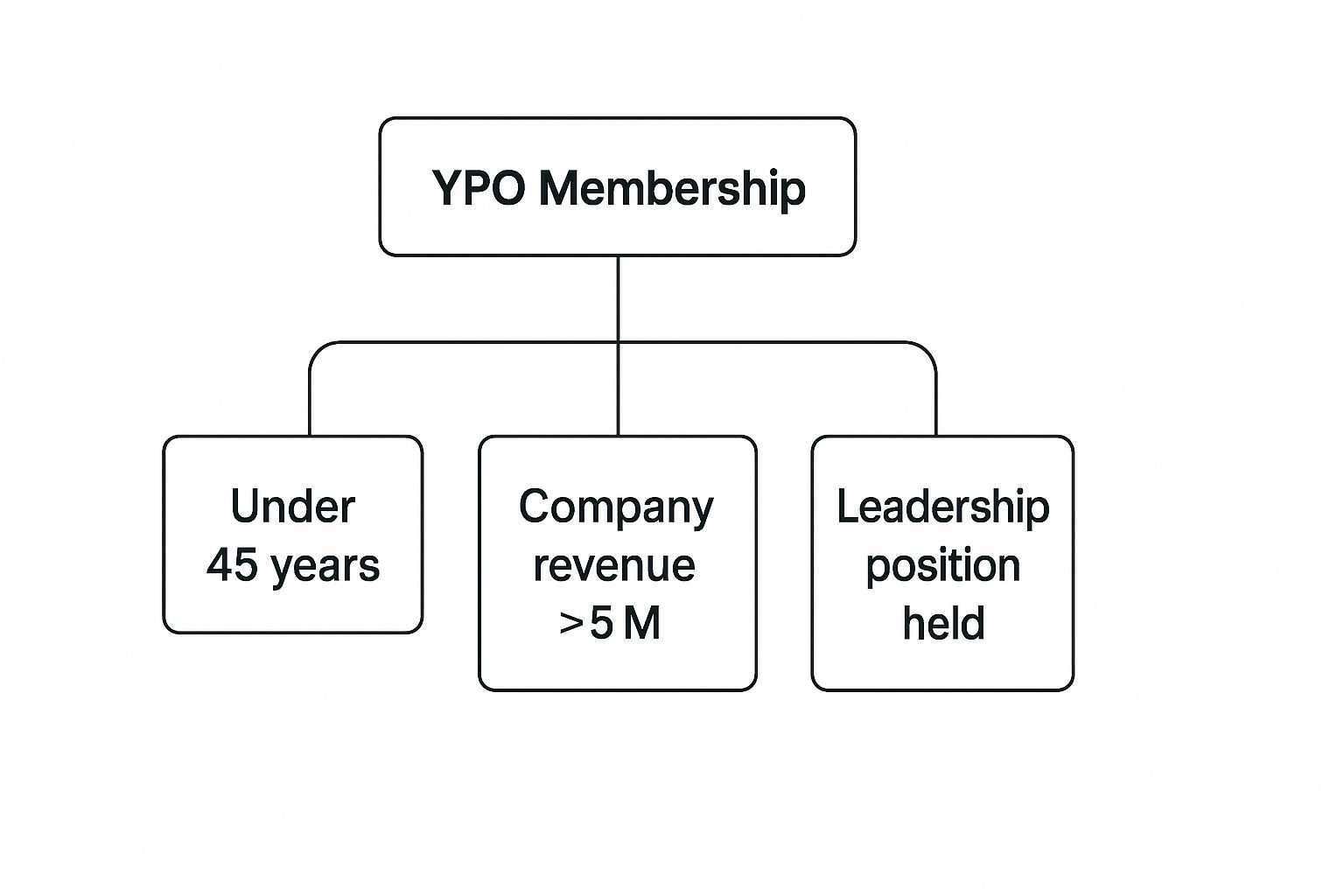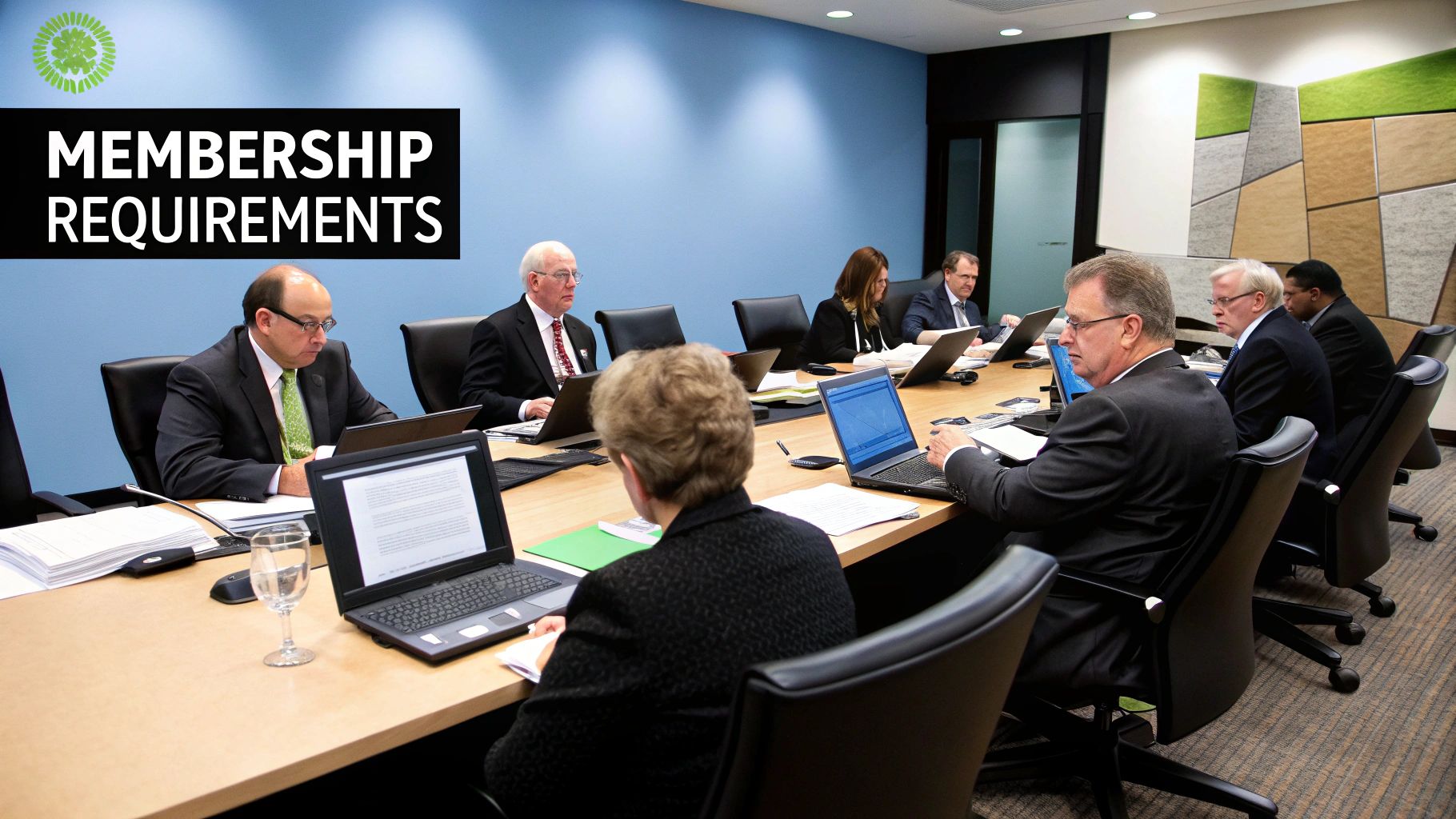Stay Updated with Everything about MDS
Thank you! Your submission has been received!
Oops! Something went wrong while submitting the form.

Chilat Doina
July 30, 2025
Joining the Young Presidents' Organization isn't quite like signing up for a standard business group. It’s more akin to qualifying for an elite team where every player has proven they can compete at the highest level. The criteria are strict for a reason: to ensure every single member is a true peer, navigating challenges of a similar scale and complexity.
This isn’t about being exclusive for its own sake. It’s about intentionally building a high-trust environment where the advice you get is from someone who truly understands the weight of your decisions.
To even get in the door, you have to clear a few fundamental hurdles. Think of these as the non-negotiable pillars of YPO eligibility. Getting a handle on them right away will tell you if you’re in the right ballpark for membership.
This visual breaks down the main requirements at a glance.

As you can see, the big three are age, your specific role, and your company's financial scale. If you don't meet one of these, your application likely won't move forward.
YPO’s criteria are thoughtfully designed to bring together leaders who are at a very specific, high-stakes moment in their careers. While the core standards are consistent across the globe, some local chapters might have slightly different financial or employee count requirements.
Here’s the breakdown:
To make it even clearer, here’s a quick summary of the requirements.
These benchmarks are the bedrock of the YPO experience.
The whole point of these strict rules is to cultivate a genuine "peer-to-peer" environment. When every member is leading an organization of significant size, the conversations, advice, and shared struggles become incredibly relevant and powerful.
Meeting these prerequisites is just the first step. If you want to dive deeper into how the organization works and who its members are, you can learn more about the YPO Young Presidents' Organization and see what makes it such a unique space for chief executives. Each criterion is a building block for that exclusive, high-impact ecosystem.

Of all the hurdles to joining YPO, the age limit is the one that sparks the most conversation. You have to join before your 45th birthday. This isn’t just some random number pulled out of a hat; it’s a core piece of the YPO strategy, designed to shape the entire community.
The idea is to bring together leaders who are all in the thick of it—navigating the intense, high-growth phases of their careers and personal lives at the same time. Think of it as a specific cohort where everyone is in a similar life stage. They're often juggling rapidly expanding businesses while also raising young families and hitting other major life milestones, creating an incredibly powerful shared experience.
This age requirement makes the conversations inside YPO forums exceptionally relevant. When members share their challenges and wins, everyone in the room gets it because they're likely facing the exact same pressures. The advice you receive isn't just theory; it’s battle-tested wisdom from someone who was in your shoes last week.
Focusing on this specific career window is what makes the organization so valuable. You can get a much deeper sense of how these peer dynamics work by exploring comprehensive guides on YPO that really unpack the community’s structure.
By curating a group of leaders under 45, YPO builds a vibrant ecosystem where members grow together, forging relationships that are both professionally and personally profound.
YPO understands that great leadership doesn’t stop at 45. The age rule is for getting in, not a lifetime cap on being involved. Once a member hits 50, they don't just get a handshake and a "thanks for playing."
Instead, they graduate to YPO Gold, the organization's esteemed alumni network. This is how the community provides value that lasts a lifetime. YPO Gold allows these seasoned leaders to continue their journey, sharing decades of wisdom while keeping the trusted relationships they’ve built over the years. It’s a brilliant structure that ensures the network's power stays with you for good.
It's not just about age. A huge piece of the YPO puzzle is your actual role in the company. Simply having a fancy C-suite title on your business card won't cut it—YPO is looking for the one person with ultimate authority and final responsibility.
Think of your company as a ship. It's got plenty of skilled officers on board, each managing a different, vital department. But there's only one captain. Only one person has the final say and is accountable for the entire vessel's direction and safety. That's the level of leadership YPO is built on.
The core principle here is ultimate operational control. Your title has to reflect the reality that you're the primary decision-maker who carries the full weight of the company's performance on your shoulders.
This is why titles like CEO, President, Chairperson of the Board, or Managing Partner are the ones that typically qualify. These roles aren't just about managing a function or a division; they inherently come with responsibility for the entire enterprise.
This is a common question, and a good one. What if you're the president of a multi-billion-dollar division within a massive Fortune 500 company? Can you get in?
The answer is yes, but it comes with a big "if." The division you lead has to operate like its own standalone company. It must independently meet all of YPO's financial and employee requirements, and you must have full, autonomous P&L and operational control over that specific segment.
The key qualifying roles usually boil down to these:
This strict focus on the top leader is non-negotiable. It’s what preserves the integrity of the peer group, ensuring every single member in a forum is wrestling with a similar magnitude of responsibility. That's what makes the shared insights so incredibly powerful and relevant.

Once you’ve ticked the boxes for age and your leadership role, the financial metrics are usually the trickiest part of the YPO puzzle. This isn't just about turning a profit. It’s about proving you're at the helm of an organization with significant scale and complexity. YPO uses these benchmarks to make sure every member is captaining a similarly sized ship.
The most common yardsticks are your company’s annual revenue and the number of people on your payroll. These figures act as a baseline, giving a quick sense of the operational weight you manage day in and day out. Think of it like a minimum weight class in boxing—it ensures you’re stepping into the ring with peers of comparable size and strength.
Here's a key point: these financial requirements aren't a one-size-fits-all deal. YPO gets that a tech startup, a manufacturing plant, and a financial services firm are playing completely different games with different economic rulebooks.
For instance, a capital-heavy manufacturing business will likely be judged on its revenue and employee numbers, which could mean millions of dollars and hundreds of staff. But what about a financial firm or a lean, high-margin tech company? They might have a smaller team but a massive enterprise value.
This flexibility is what makes the process work. It means the ypo criteria can fairly size up leadership impact across all sorts of different sectors. The organization adapts its lens to fit the industry, focusing on the real-world complexity you're actually leading.
YPO is looking for substance, not just simple numbers. They want to measure the true scope of your responsibility, whether that shows up in a large workforce, high revenue, or a substantial market valuation.
That brings us to another important idea in this evaluation: enterprise value. This metric gives a much more complete picture of a company’s worth, almost like how a private equity firm would value a potential investment. It looks beyond annual revenue to include things like debt and cash on hand, painting a clearer picture of the company's overall financial health and standing in the market.
It's similar to how regulators set up criteria for sophisticated investors. For example, U.S. securities law defines an accredited investor as someone with a net worth over $1 million or an annual income above $200,000. This ensures they have the financial savvy to handle complex investments. If you're curious, you can check out a global guide to IPOs to see how these kinds of financial benchmarks play out in other high-stakes environments.

So, you meet the tough financial and leadership requirements. That’s a huge first step, but it’s really just the beginning of the conversation. Getting into YPO isn't like applying for a business credit card; it's a rigorous vetting process designed to protect the very core of the organization.
Think of it less as a club application and more like an invitation into a highly confidential inner circle. Every single stage is there to confirm not just what you've achieved on paper, but who you are as a leader and how you’ll fit within a tight-knit chapter.
This isn't about being exclusive for the sake of it. The whole value proposition of YPO hinges on the absolute trust and confidentiality shared between members, and the application process is the gatekeeper of that trust.
The path to YPO membership is a journey with several key milestones, and it requires both patience and active participation. While the finer details can shift slightly from one chapter to the next, the overall structure is quite consistent.
It all starts with sponsorship. You can't just fill out a form on the website and hope for the best. You must be sponsored by at least one, and often two, current members of the specific chapter you want to join. This initial backing is a powerful signal that you’re a potential good fit.
Once you have a sponsor, you’ll move through several distinct stages:
This interview stage is where they truly assess the "fit." They’re looking for more than just a successful CEO. They want to see genuine curiosity, an openness to being vulnerable, and a commitment to contributing to the group’s dynamic, not just taking from it.
When you look at a list of requirements that demanding, it’s natural to ask: why bother? The answer is simple. YPO’s strict criteria aren't there to be exclusive for the sake of it. They exist to build something most networking groups can only dream of—an ecosystem built on a foundation of absolute trust and genuinely shared experience. It ensures that every single person in the room is a true peer.
This shared ground is what makes the whole thing so powerful. The real heart of YPO is the YPO Forum. Imagine a small, confidential group of 8-10 fellow leaders from completely different industries who essentially become your personal board of advisors. It’s a space where you can lay your most complex business challenges and personal crossroads on the table, knowing that confidentiality is sacred. For many, this unique support system is the number one reason they join.
Beyond the forum, membership opens the door to world-class learning opportunities and a global community that’s second to none. For YPO members, standing still isn't an option. Continuous growth is part of the DNA, and many look for ways to amplify the insights they gain. For instance, leaders often enhance their executive leadership development to build on what they learn inside their chapter. It's this commitment to constant improvement that keeps the network so vibrant.
This global reach is more than just a nice-to-have in today's economy. Take the global IPO market, which saw 291 deals raise US$29.3 billion in Q1 2025 alone—a landscape made even more complex by new policies and economic curveballs. Having a trusted network to help you make sense of it all is priceless. You can dig into the specifics of these global IPO trends to get a clearer picture of the environment leaders are facing.
The real ROI of YPO isn't just business contacts; it’s the trusted advice from peers who genuinely understand the weight of your decisions, creating a support system no other organization can replicate.
Ultimately, the investment of time and resources pays off in ways that impact both your bottom line and your personal well-being. To get a head start, you can check out our guide on how to use YPO Connect effectively and start maximizing these connections from day one.
Of course. Here is the rewritten section, crafted to sound like it was written by an experienced human expert, following the provided style guide.
Getting into the specifics of YPO eligibility can feel a bit like peeling an onion. The standards are famously high, and for good reason, but understanding the gray areas can make all the difference. Let's tackle some of the most common questions that pop up for potential applicants.
It's important to remember that the strictness of the YPO criteria is intentional. It’s what ensures every single member, no matter their chapter or industry, is navigating a similar scale of leadership and complexity. That shared ground is the secret sauce to the organization's powerful peer-to-peer dynamic.
The short answer is: rarely. While local chapters have a bit of discretion, the core requirements for age and company financials are pretty much set in stone. Major exceptions are almost unheard of.
Think of it this way: the standards are kept consistent globally to protect the integrity and value of the peer group. Your best bet is always to connect directly with a local chapter to get a feel for how they interpret the guidelines on the ground.
Membership isn't cheap, and it's structured as a serious investment in yourself. You'll have a one-time initiation fee plus annual dues, and these figures can vary quite a bit from one chapter to another.
All told, you can expect the cost to be several thousand dollars per year. These fees are what fuel the chapter's operations, exclusive events, and the global platform you get access to.
The costs reflect the immense value delivered through curated peer groups, exclusive learning events, and a trusted global support system. It's a commitment to transformative personal and professional growth.
This is a great question because business is never static. YPO gets that.
If you meet all the criteria when you're accepted, your membership is generally secure for life, as long as you remain a member in good standing. So, if your company gets acquired and your new role doesn't quite meet the financial thresholds, you can typically keep your spot and, more importantly, the deep relationships you've built over the years.
At Million Dollar Sellers, we know firsthand the game-changing power of a high-caliber peer network. We bring together elite e-commerce entrepreneurs to share what's actually working and scale their businesses smarter, not harder. If you're a top seller ready to connect with the best in the business, find out if you qualify for our exclusive community. Learn more about Million Dollar Sellers.
Join the Ecom Entrepreneur Community for Vetted 7-9 Figure Ecommerce Founders
Learn MoreYou may also like:
Learn more about our special events!
Check Events